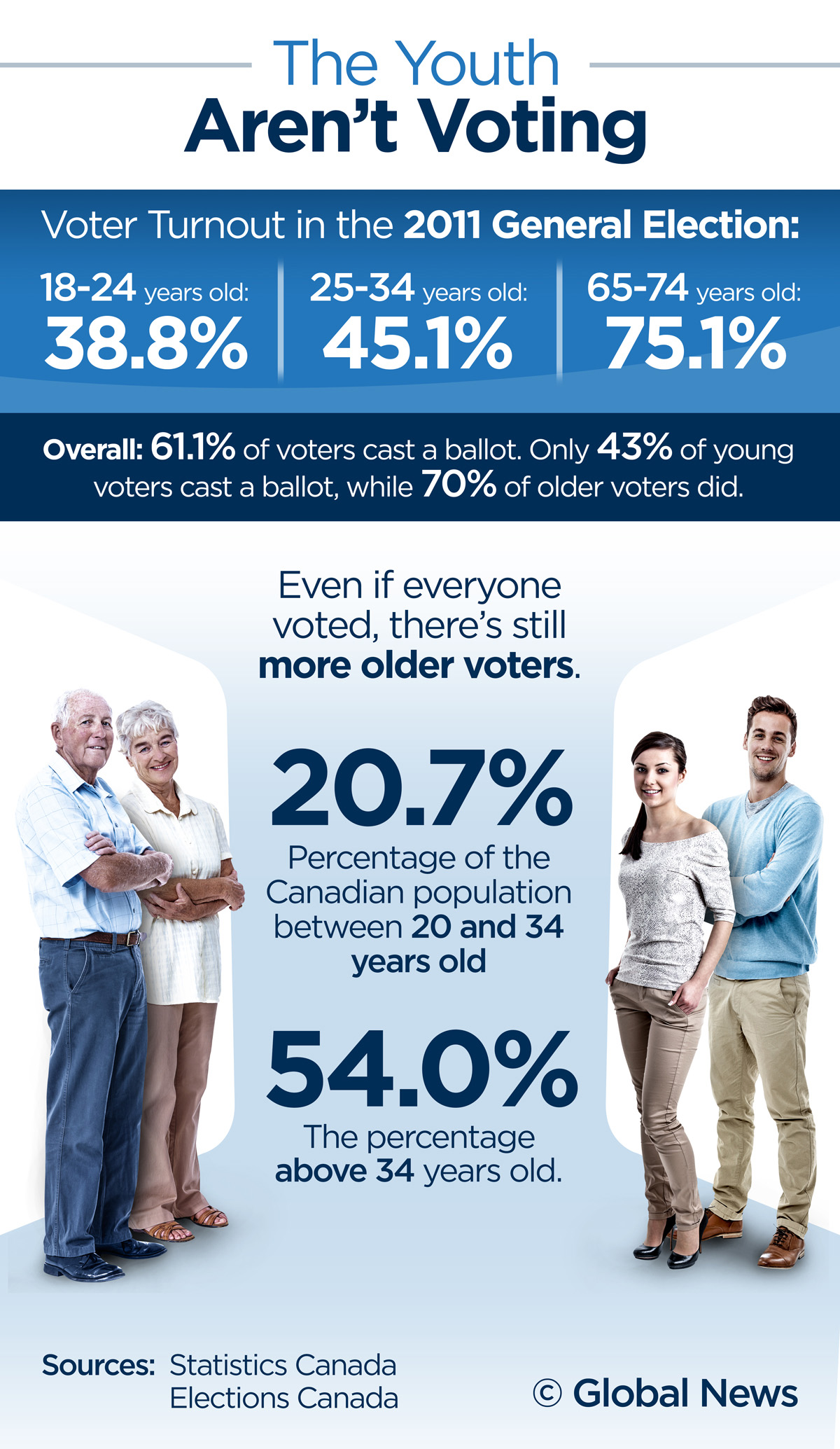WATCH ABOVE: Justin Trudeau speaks to ET Canada about the troubled youth vote. See the full interview on ET Canada.

All three political parties have their own way of rallying their supporters on Election Day. Getting people above the age of 34 isn’t that hard – some estimates say nearly 70 per cent of older Canadians vote.
It’s the kids who aren’t alright with voting.
“They have less stake in the system, they’re less likely to have a job, they’re less likely to be married, they’re less likely to have a big bank account, they’re less likely to have a mortgage, they’re less likely to own a home, they’re less likely to have a reputation. So all those things make you less vested in the system,” Nelson Wiseman, a politics professor at the University of Toronto said in an interview Tuesday.
It’s difficult to say exactly how many Canadians of a certain age do or don’t vote. Elections Canada says 61.1 per cent of eligible voters cast a ballot during the 2011 election but have different numbers as to how that breaks down by age.
One Elections Canada document suggests only 38.8 per cent of people aged 18 to 24 made it to the ballot box. Meanwhile, 75.1 per cent of voters aged 65-74 did.
Elections Canada tried to figure out why Canada’s youth weren’t voting. According to a 2011 survey, 12 per cent of non-voters said they just didn’t care, and another 11 per cent said they didn’t know enough. The most common answer was that personal circumstances like school, work, or family obligations kept them away from the ballot box.
But nine per cent of non-voting youth told Elections Canada that they either didn’t think their vote mattered, or didn’t trust any of the candidates.
Liberal leader Justin Trudeau, however, recently told ET Canada that if youth want to be listened to, they have to vote.
“If you don’t engage and step up in the electoral process your voices aren’t going to get heard,” Trudeau said.
“What matters is not just about getting a few more progressive votes out there, although I’ll certainly take that, it matters that young people’s concerns, whether it’s poverty, the environment, or human rights or social justice get addressed.”
Young voters tend to lean left. According to Wiseman, if the youth voted at the same rate as people above the age of 55, Canada would have an NDP government.
READ MORE: Calgary Liberal candidate apologizes for offensive tweets
Laurin Liu, the NDP candidate for the Quebec riding of Rivière-des-Mille-Îles, said she frequently hears Canadian youth express cynicism in the political process – and that’s one reason they don’t vote.
“Going door to door is a great way to counter that, it shows that candidates are accessible and brings politics literally onto the door steps of constituents,” she said in an interview Tuesday.
“Usually when people tell me they’re not going to vote, those people end up changing their minds because they do feel like they’ve been engaged.”
Liu says the NDP in Quebec go straight to young voters in order to get them engaged in politics. She began her political career with the local CEGEP club. She admits that most people involved in those clubs are already likely to vote, it does provide youth with a platform to engage in the political process.
READ MORE: Are Canada’s newly-created jobs ‘part-time,’ ‘precarious,’ and ‘low-paid’?
Tim Laidler, the 29-year-old Conservative candidate in Port Moody – Coquitlam, said his young volunteers help his campaign connect with youth voters.
“We found with our campaigns here in the summer that we’ve got quite a few youth volunteers coming out, a bunch of students that just graduated from high school, they looked us up and they’re actually some of our best volunteers,” he said.
In order to connect with them, he said, he talks about his experience in the military and attending the University of British Columbia and suggests the Conservative party is best positioned to help them move into the working world.
While youth voters as a group tend to lean to the left, Laidler suggested many that he’s met when going door-to-door are still non-partisan and issue-focused.
Liu agreed that many young people are focused on issues and cautioned against breaking up the topics into two camps; youth-issues and non-youth issues.
“I think that it’s really important to stress the fact that young Canadians care about the issues that all Canadians care about,” she said. “Rather than just putting issues into a young voters box, or talking to young voters differently, I think they do care about the issues that come up in the debates.”




Comments